It should come as no shock that a recent report released from LinkedIn showed the fastest-growing U.S. job in terms of number of hires is an Artificial Intelligence Specialist. This rising demand for machine intelligence is breaking through into all different aspects of life, including medicine, surveillance, social networks, and much more. We’ll take a look at how AI is taking over in 2020 and what resources on this hot news topic can be found in HeinOnline.
Here, There, and Everywhere
The field of artificial intelligence research began in a workshop at Dartmouth College in 1956. With advancements in computer power and theoretical understanding, along with access to large amounts of data, AI surged in the twenty-first century. AI continues to make headway in 2020 with new technological advancements in machine learning systems. People are interacting with AI in their everyday life and probably don’t even realize it.
Facial recognition is now available for smartphones. Larger companies like Google and Apple are experimenting with bionic chips in phones to aid with speech recognition. Social media networks like Facebook and Instagram are controlling the ads you see and can automatically tag your friends in your photos. Of course, we can’t forget Siri, whom you can interact with through your phone or Apple watch. Siri only sparked more computerized helpers such as Amazon’s Alexa. More than 10.4 million Alexa-enabled smart speakers were shipped via Amazon in the third quarter of 2019 alone. If you didn’t know, Alexa is able to play music, provide information, deliver news and sports scores, tell you the weather, control your smart home, and even allow Prime members to order products from Amazon.
Speaking of Amazon, there are now 24 Amazon Go stores that use cameras and AI to monitor what you’ve taken off the shelf and charge you as you walk out. Start-up companies are experimenting with smart shopping carts that use AI to determine what you’ve placed in your cart. Customers can pay using a credit card, Apple Pay, or Google Pay and on their way out the door, the cart will light up green, indicating the order is complete. If the light turns red, a store employee is called.
All of these technological advances really simplify certain tasks in life, but AI is also breaking into the field of medicine. The same skills that humans use to read microscope slides, X-rays, and MRI scans can now be done by machines through AI. Researchers from Google and from medical centers are training computers to recognize patterns linked to specific conditions that can be hard for a person to see. Similarly, a new system is being studied that reads mammograms. The outcome of this initial research is indicating that in some cases the AI machines are more accurate than radiologists themselves.
Do you struggle with mental illness? There’s an app for that! Mindstrong Health is a start-up still in the early development stage that uses AI to follow how you tap, scroll, and type on your phone to analyze your mood. The results can trigger your therapist to check in with you outside of your therapy sessions if your actions are indicating that you need help.
Artificial intelligence is only going to develop further, but it brings up questions regarding privacy and accuracy. Let’s take a look at HeinOnline and see what research we can find on this hot topic.
AI in HeinOnline
There are a few different ways to research this topic in HeinOnline. Users can utilize the Catalog tab found within the main search bar. Type the phrase artificial intelligence into the Catalog tab to see a list of titles that contain that phrase, including:
- Artificial Intelligence and National Security
- The Weaponization of Increasingly Autonomous Technologies: Artificial Intelligence
- Artificial Intelligence: Emerging Opportunities, Challenges, and Implications
Why not utilize HeinOnline’s artificial intelligence while researching this topic! Navigate over to the Advanced Search section of the Law Journal Library and select Artificial Intelligence from the Topics section.
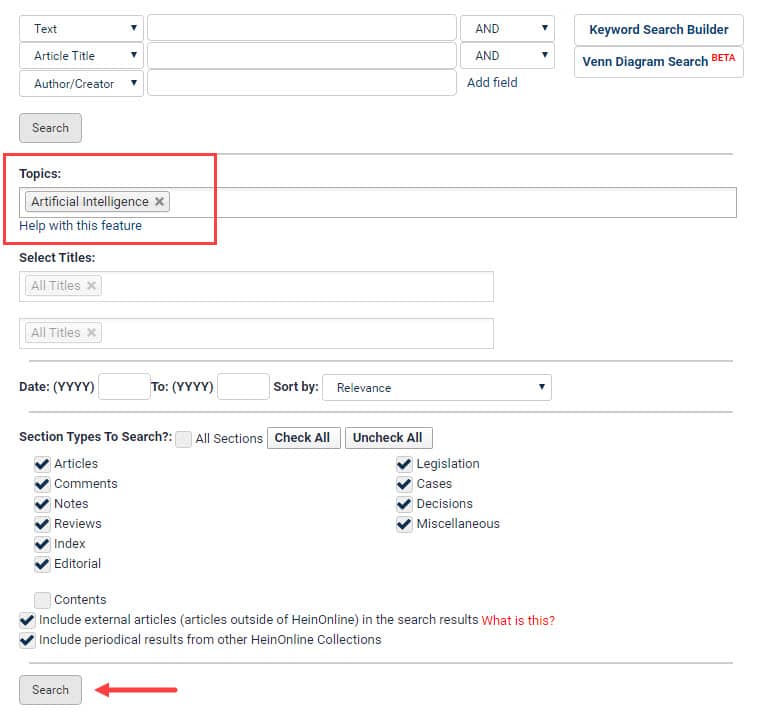
From the results page, users can find topics and entities under the Refine Your Search section. HeinOnline uses natural language processing and machine learning tools to include even more relevant articles. Topics are subject designations applied to an article by analyzing similar, precategorized documents. Entities include a list of locations, people, and organizations mentioned in the list of results.
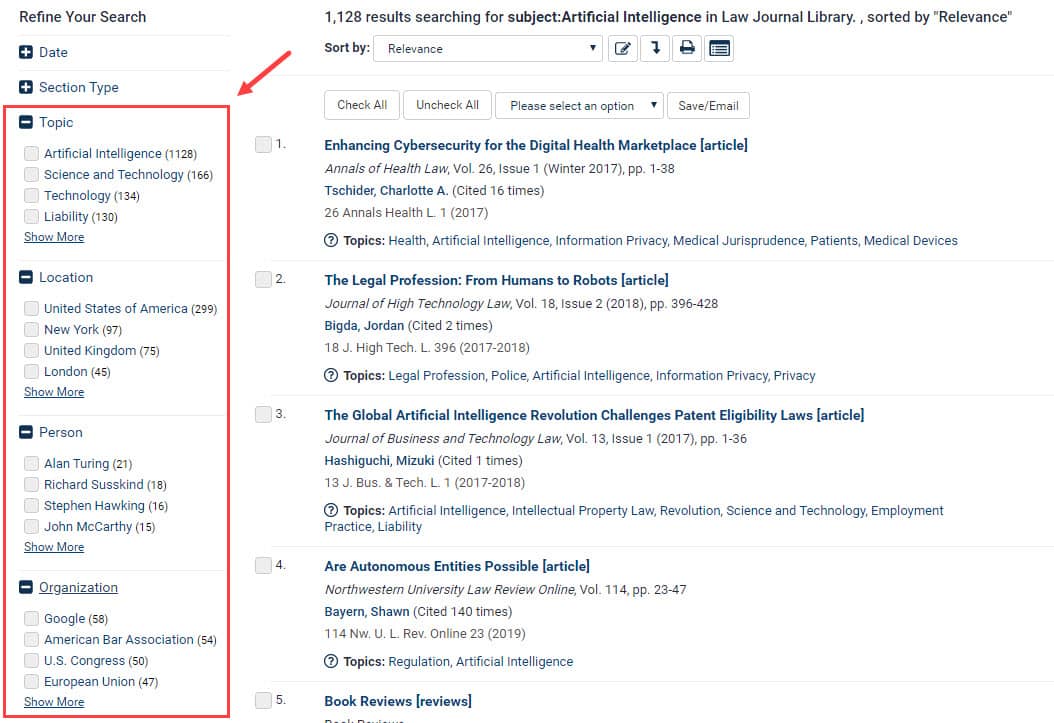
Refine the search by choosing United States from the Location facet and then select Volume Date (Newest First) from the Sort by option. Results include relevant articles such as:
- Regulating Bot Speech
- Will Algorithms Take the Fairness Out of Fair Use?
- The Bot Legal Code: Developing a Legally Compliant Artificial Intelligence
Explore even more artificial intelligence tools in HeinOnline with our More Like This button. For example, let’s say we stumble upon the relevant article, Enhancing Cybersecurity for the Digital Health Marketplace and we want to see more like it. Click the More Like This button located above the article.
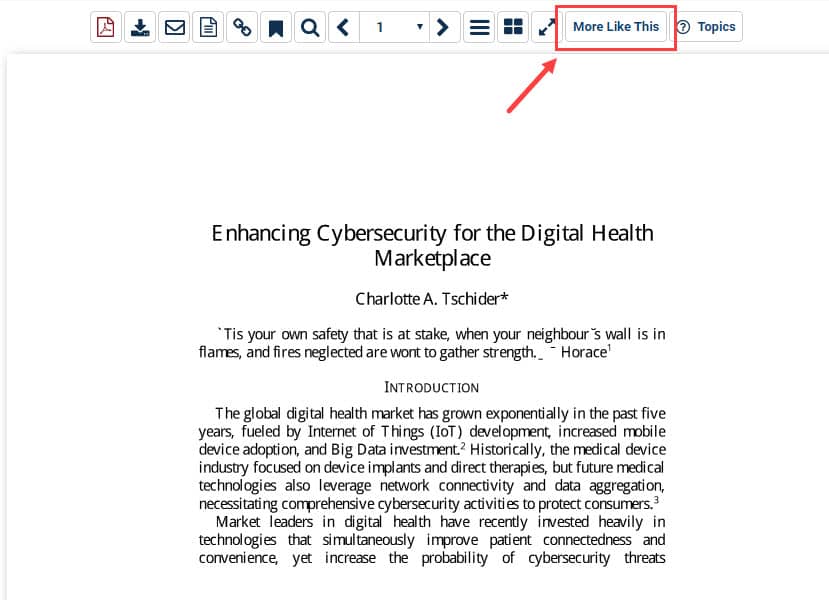
This tool uses a program that finds “interesting words” in an article, as determined by an algorithm that analyzes the article’s text. It then provides a list of similar articles based on the interesting words found in the original article.
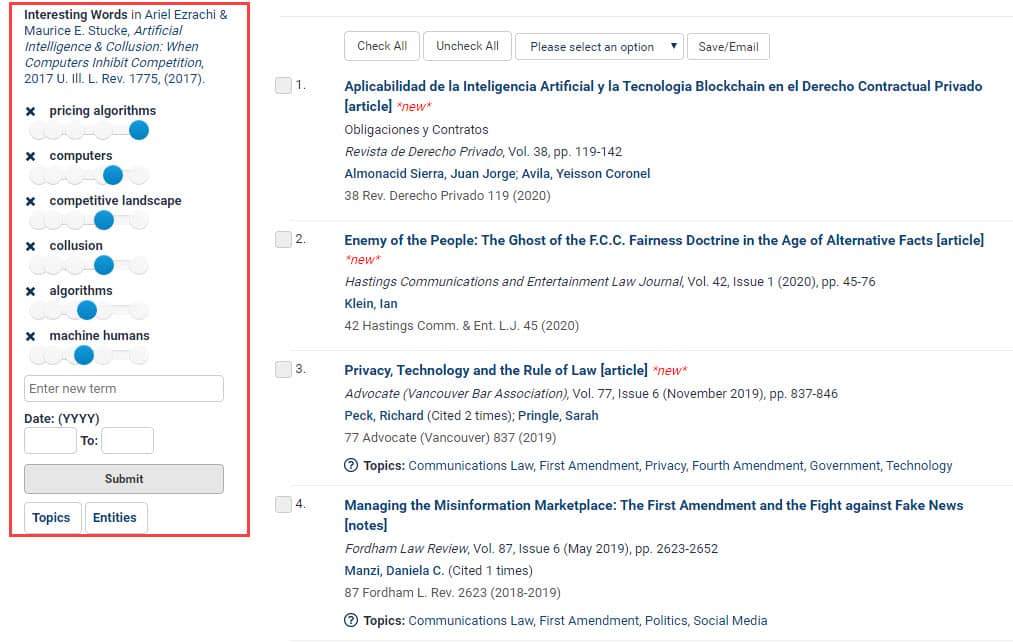
With this tool, users can adjust the boost factors on the interesting words, remove or enter new terms, and select a date range to change the scope of the results.
We don’t stop there! Another useful tool in HeinOnline that utilizes artificial intelligence is the Keyword Search Builder. Navigate to the Advanced Search section of the Law Journal Library to find this tool. Next, enter keywords into one or more boxes and use the boost levels to give more weight to the most important terms in the query.
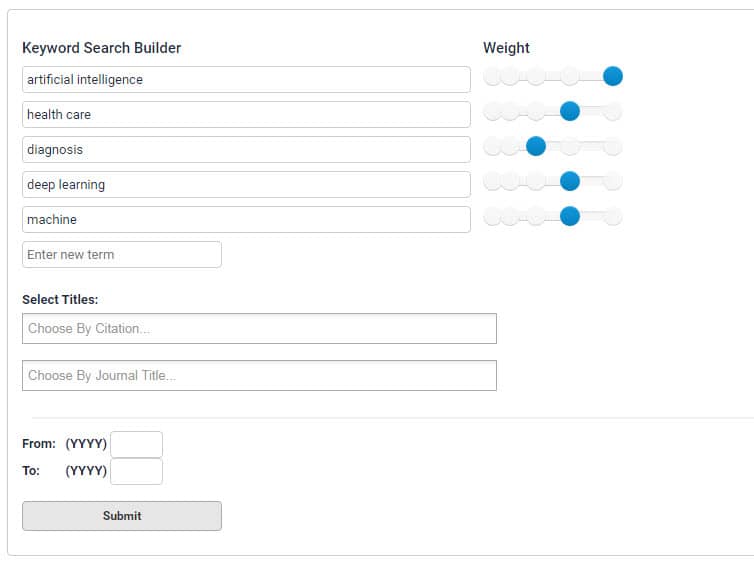
Results include relevant articles such as:
- When AIs Outperform Doctors: Confronting the Challenges of a Tort-Induced Over-Reliance on Machine Learning
- Artificial Intelligence in Pharmaceuticals, Biologics, and Medical Devices: Present and Future Regulatory Models
- Ethical Issues of Artificial Intelligence in Medicine
Learn More
To learn more about the artificial intelligence tools in HeinOnline, check out these blog posts:
- New Machine Learning and Natural Language Processing Tools in HeinOnline
- Natural Language Processing and Machine Learning Tools in HeinOnline: Part 2
- Natural Language Processing and Machine Learning Tools Added to More Databases in HeinOnline!
For help searching or navigating HeinOnline, contact our dedicated support team at (800) 277-6995, holsupport@wshein.com, or via Live Chat!



